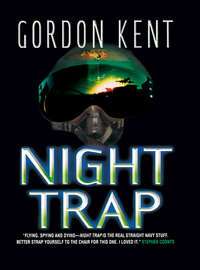
Полная версия
Peacemaker
“Yes, sir.”
“Victor-II class submarines. MiG-29s. I want my subs hunted by whatever the latest is that the Soviets have got—the Helix A?”
“Mmm—KA-27PL.”
“Well, extrapolate an upgrade. You know as well as I do the Soviets have one by now. The best, understand? Kirov-plus cruisers. I want an exercise against their best. I don’t want any of this ‘real-world’ crap. ‘Real-world’ means unreal world. Get me?”
“The, um, LantCom Planning Office is scripting a scenario. I’ve been picking their brains. They’re thinking, um, one threat as Libya and the other as Yugoslavia.”
“Negative! See, that’s exactly what I mean. That’s what they’d call ‘real world.’ We can lick those pathetic bastards without a rehearsal. Negative that. You script me a Fleetex that puts me against the Soviets in waters where they can bring their good stuff to bear. Get me?”
The IO nodded. He cleared his throat. “I’ll leave it to you to deal with LantCom, sir?”
“Yeah, yeah, yeah, yeah.”
Interservice Virtual Intelligence Center, Maryland.
“Peacemaker?”
Colonel Han was Chinese-American, an engineer. Suter, fresh from his briefing by his acidic new boss, George Shreed, disliked Han on sight. Han, he could tell, was Mister Nice Guy. Well, screw that.
“Let me put you in the big picture first,” Han said when he had settled behind his desk. “You know what IVI is, or you wouldn’t be here.” He pronounced the acronym for Interservice Virtual Intelligence like “ivy.” The halls of IVI. His round face smiled on Suter.
“Communications research,” Suter replied, “which is why it falls under the Agency’s umbrella.”
Han grunted. He was turning a ballpoint pen in stubby fingers. “The Agency’s mandate inside the US is communications, right.” He smiled again, but Suter suspected he disliked Suter on sight as much as Suter had disliked him. “So your responsibility will include keeping communications separate from anything else, anything that isn’t part of the CIA mandate. Right? I mean, that’s partly why you’re here. Right?”
“What’re you getting at, Colonel?”
“You don’t want your agency to get involved in things outside its bailiwick, right?”
“I’m afraid I don’t follow you.”
Han looked up at him and they stared at each other. Han dropped the pen. “Come on, I’ll show you around.”
They started at the top floor of the three-story building, where there was a suite of offices and meeting rooms that would have suited one of the new high-tech, high-risk companies. Suter thought that there was something vaguely pushy about the place, a bit too much of a good thing. “We entertain up here,” Han said. Our friends in Congress, he meant. At least that was the way Suter had heard it from Shreed.
The next floor down was a work floor, endless cubicles, an outer ring of small offices, some sort of atrium that looked down at the security desk and the lobby and up at the rain that was falling on a glass dome. In the back was a big, windowed cafeteria where people were already sitting drinking coffee. Again, there was the feeling of a start-up, lots of very young people, jeans and T-shirts, few neckties. “We hire them for their brains,” Han said. No explanation.
There were three floors below the surface. Each had its own security check and a security lock where, for a few seconds, they were held between closed gates. “If you’re claustrophobic, you’re not for us,” Han said. He held up a card to a television camera while they waited inside the lock, and a voice said, “Now the other gentleman, please.” Han moved Suter forward with pressure on his arm, and Suter turned his face up to be seen and then held up the temporary pass he’d been given. “Thank you,” the voice said. Suter couldn’t tell whether it was a human voice or a computer.
Down there, attempts had been made to disguise the fact that it was underground, but you couldn’t make windows where the outdoors was solid earth. It was bright and colorful, but at the end of a day a lot of people would breathe fresh air with real hunger. The spaces, as if to try to compensate, were larger, the cubicles fewer. The people were older, more male than female; Suter thought he recognized the look of ex-military. Uniforms, he knew, were not allowed.
The second below-ground level had at least two laboratories and a model-making shop. Han made this part of the tour pretty perfunctory, as if these were nuts-and-bolts places, not where the real work went on. Then they got in the elevator and started down to S3.
“So,” Han said. “What do you think?”
“Where’s Peacemaker?” Suter said. “It’s the reason I’m here.”
They got out of the elevator and went through the security check and into the lock. When they stepped out of the lock, Han said, “I think I’ll take you right to the general and let him explain Peacemaker to you.”
Suter asked a couple of questions as they walked along the central corridor, but Han didn’t answer. He didn’t like pushy questions, was what he was saying.
A few women could be seen down here. Suter eyed them, looking for a hit. He had been married, now was not. In fact, it was the end of the marriage that had freed him to leave the Navy—no, actually, freed him to let loose the ambition he had been holding in check. She had never liked the ambitious Suter. She made me a different person. Limited me. With her, I was just another nice shmuck. It never occurred to him to wonder what she had thought about it, or if she had been another person in the marriage, too. He was simply terribly glad to be rid of her. Except for the sex, so he was now looking around.
“The general” was Brigadier Robert F. Touhey, USAF, a small, round man about fifteen pounds over a healthy weight, with shrewd blue eyes, a sidewall haircut, and just a touch of the Carolinas in his voice. He was wearing a white, short-sleeved shirt and a blue tie, as if it was summer; when he stood up, he was several inches shorter than Suter, but he had a handshake like a Denver boot. They made polite sounds, and Touhey let go of Suter’s hand, and Han muttered something that caused Touhey to give him the briefest of cold looks before he said, “Sure, okay, you take off, Jackie.” Then he motioned Suter to a chair.
Suter sat, opening his coat. The room was hot. Touhey plopped back into his desk chair and said, “What’d you do to old Jackie? He don’t like you.”
“No idea. What makes you think he doesn’t like me?”
“I can tell.” Suter leaned back. Touhey’s face was made for smiling, and, even in repose, it seemed to have the beginnings of a smile. Touhey seemed to be smiling at Suter now—but was he? “So,” Touhey said. “How’s my old buddy George Shreed?”
Suter nodded, smiled. “He sends his regards.”
“Regards!” Touhey laughed. “What’d George tell you about me?”
“He said you were the best empire-builder in the American military.”
Touhey guffawed. “And you better believe it! Alla this—” Touhey waved a hand that included the office, the building, the idea “—is my empire. I grabbed it; I rule it; and I’m gonna go on ruling it. Administrations come and go; Touhey endures. How’d you connect up with Shreed?”
“He got in touch with me.”
“What about?”
“Somebody who was going to serve under me.”
“Good or bad? Come on, George don’t dick around; what’d he want?”
“He wanted to warn me.” In fact, George Shreed of the CIA had wanted to tell him that Alan Craik was a thorough-going shit, and Suter should be careful. Shreed really hated Craik. “We had lunch, hit it off.”
“He recruited you?”
“I guess.”
“Don’t guess, okay? I don’t like vague shit. I’m a scientist and a politician, call me a scientific politician. Vagueness is for people got time to dick around. I don’t. George recruit you?”
“Yes.”
“Right there, one lunch? Man, you came cheap. So, what—he pulled strings, got you outa the Navy quick-time? Musta wanted you. If George Shreed wanted you, I better watch my ass.” Touhey smiled.
“He was moving up to a new responsibility. He wanted to reorganize.”
“Right. ‘No contingent trails.’ Okay. He sent over a file on you; you look okay. The impression I get is, you’re the kinda man can always go into the woods and find a honey tree—am I right about that? I think I am. Divorced. No kids. You a loner, Suter?”
“Maybe. I never thought of it that way.”
“‘He travels the fastest who travels alone.’ Kipling. Okay. Whatta you know about Peacemaker?”
Suter was sweating. Could he take off the suitcoat? He wasn’t quite sure how to handle this highly intelligent redneck. He decided to wear it and sweat. “I know it’s just coming out of the closet. That it’s a low-earth-orbit satellite system. That it’s part of an intelligence-communications effort. That it’s controversial. That it rang Colonel Han’s bells when I mentioned it before he did.”
“Go on.”
Suter shifted his weight and a rivulet of wet trickled down his right side. “Shreed told me it’s a weapon.”
“Ri-i-ight! By which you mean, it’s a weapon in this room, but you say it anyplace else and it’s deny, deny, deny. Old George is with me on this one; we see eyeball to eyeball. Common ground down someplace where his ideology and my theory about intelligence come together, although it’s like an ox and a bear hitched to the same plow. George and I want this thing for different reasons, but we don’t see any purpose in killing each other just yet, and we’re kissy-kissy around Congress and the White House so’s the project will succeed. You being George’s boy, I expect you to go along one hunnerd percent. Right?”
“Yes, sir.”
“Damn right. Let me tell you about Peacemaker. No! Let me tell you about intelligence. Intelligence and the modern battle. Now, you’re an intel guy. Wha’d you do in the Navy? Carrier intel—what do you guys call it, CAG AI? Right. You got lots of intel from this source and that, you patched it together and strained it and shaped it and you looked at the target lists and the briefing books that Uncle provided, and then you made up something comprehensible for the jet jocks, and they took off and did what B.F. Skinner tried to get pigeons to do, which is use your intel to carry a weapon to target. Now, that’s asinine.
“Here’s my theory of intelligence. Intelligence and force projection in the electronic world are the same thing. To have a thought should be the same as to use that thought. Idea is action. Stay with me here: the usual model, the model you used on your aircraft carrier, is pre-electronic. It’s all about the failure of intelligence that’s built into slow communication. The great example is the Battle of New Orleans. The British come up into the swamps and Andrew Jackson and a lotta people shoot the ass off them, and the British tuck their tails and go away. Only trouble is, the war had been over six weeks before they started.
“When you got slow communications, you in effect got no intelligence worth the name—everything happens the night before the battle, the day of the battle, the moment of the battle. The intel guy is just some no-respect major who can read maps. Who matters is the guy who has the muscles to carry the weapon.
“But come up to the 1980s. Now I can take a photo and have it come up simultaneously on a missile that’s already in the air. The missile don’t need any pigeon to drive it; it’s got the electronic brains to drive itself, using satellite positioning and my photo. I drive it to the target. Me—the intel guy. But do they let me do it? No—they turn it over to the guys who used to carry the weapon and still want to get their rocks off.
“Now come to the 1990s. What’re we doing, mostly? We’re giving jet jocks briefing books and briefings and kneepad maps and photos and satellite coverage, and they fly off and make the same fucking mistakes that they and the pigeon could have made without all that help. Who’s still the least respected officer in a squadron? The intel guy. But who’s the one knows the most about the target? The intel guy.
“So, here’s my theory of intelligence: cut the crap. Cut out the middleman. Put your intel guy where all the electronic fields come together, and give him the button.
“That’s what Peacemaker is—the world’s first intel-driven killer. War with an arrow and no archer. George tell you how it works?”
Suter shook his head. He was a little dazzled.
“See, the problem that we saw was, you put stuff into a high orbit, you got a major launch involvement, and still you got a hell of a weight problem. You can put up your electronics, sure, but conventional weapons are heavy stuff. So we come up with something out of a sci-fi novel, no shit. What makes a conventional weapon heavy? Fuel and explosive. Okay, do away with both a them, you got your problem licked. Whatcha got out there in orbit instead of fuel for your weapon? Gravity. Whatcha gonna put up there instead of explosives? Manmade meteorites. Like a goddam cafe-curtain rod, only made of either ceramic or spent uranium, we ain’t decided which—doing tests next month from the high-altitude research aircraft out in Nevada. I favor the uranium, because I know that at Mach 5 that stuff will explode hardened concrete, I mean not just knock pieces off it, but fucking explode it!
“With the weight problem solved, we conceived Peacemaker as a low orbiter so it can be launched any old place. But low orbit means it won’t stay up long, maybe five days. Long enough. Peacemaker 1 will carry forty rods and will be in-orbit maneuverable plus or minus five hundred klicks. Above the range of all known missiles and aircraft. It’ll carry an onboard computer not much shabbier than an early Cray, plus receivers direct for optical, side-look, satellite TV, infrared, or digital data. I won’t say the thing will be able to think, but it’ll be able to compare and prioritize, and it will always be in direct contact with here.”
“Expensive,” Suter said. What he wanted to say was, That’s the greatest thing I ever heard. “Awfully expensive.”
“There’s enough pork in the Star Wars budget to do this little old thing ten times over. There’s so much pork, I oughta get some hickory sticks and start me a barbecue place. ‘Touhey’s Hog Heaven’!” He laughed. He was excited, too, just talking about it. “That’s why I need George. George can carve a pig about as good as anybody in Washington.”
“How far along is the project?” Suter found that his voice was hoarse.
“We’re going to prototype in six weeks; legal is cleaning up the contracts. They got a model upstairs, I expect Jackie whisked you by that, but you’re welcome to see it. I want to test the end of this year.”
“But—”
“Go ahead.”
“It’s destabilizing as hell.”
Touhey grinned. “Direct contravention of the ABM treaty. That’s my view of it, although there’s controversy in-house. I’ll let the lawyers work that out. Frankly, I don’t give a shit. Neither does George, who’s in it—between you and me—precisely because it’s destabilizing. It fits old George’s ideology, and he ain’t exactly over there on the far left. But you hit the sore point, yeah, and that’s why the only word we’ve leaked on Peacemaker is that it’s an intel-comm satellite. Not a weapon. That’s the way it’s gonna stay for the public and part of the Congress for the foreseeable future. But sometime we gotta go public with the weapon part, because what this is, is a weapon of fear. It don’t do squat if people don’t know about it.”
“A deterrent.”
“Well, wouldn’t you be deterred if you knew somebody could position an untouchable machine over your house and drop meteorites on it at Mach 5?” Touhey leaned back and began to scrabble in a drawer, coming up with a pack of cigarettes. “That’s why we’re gonna sell this as a support to UN peacekeeping. Our likeliest demo will be Yugoslavia—pardon, the former Yugoslavia. We’re gonna put a Peacemaker up in the Mediterranean, current plans are the Gulf of Sidra, coordinate with Navy’s Sixth Fleet—I expect you to be a help there—and we’re gonna put it up and juke it around in orbit over some of their real estate and suggest—merely suggest, meaning we’re gonna do a little discreet leaking—that this little toy might be compatible with some kinda weaponry. We think it’ll get their attention. Meanwhile, in secret, we’re gonna drop some rods on a pile of rock in the South Atlantic and see what survives.” He fiddled with a ball of paper. “You can imagine the UN debate if it’s the UN that thinks it’s gonna benefit. They won’t know whether to shit or go blind.”
“Give it to the UN?”
“Now, you know we’d never do that. We may say we will, but we won’t. Remember Reagan’s offer to give Star Wars to the world? Like that. But we’ll use it in a good cause, you bet, and I for one am not at all happy about a set of tough guys kicking ass, including women and kids, in the name of what they call ethnic cleansing, when their ethnic ain’t much to look at to begin with. And we need the PR, ’cause this is gonna be one mother of a fight when it goes public.”
“I’m supposed to be part of that.”
Touhey grinned at him. “You’re gonna be the targeting officer.” He grinned even more when he saw how startled Suter was. “George wants you to be. You’re gonna be the oversight on his investment. You got an office on this floor for the duration of the project, plus you’ll get space at our DC connection. You’re gonna ride along with me on some trips up there. You play golf?”
“Some.”
“‘Some’ don’t get the hay in. Learn to play. We get a lot of our support over a good game.” He smiled. “Not too good, mind.” He stood. He had worked a cigarette out of the pack, was now holding it in his fingers and getting ready to work a lighter with the other. There were No Smoking signs all over the building. “You’re gonna liaise with George, but in-house here you’re part of the targeting and data flow ladder. You can be useful there. Work hard.”
“I always work hard.” Suter said it proudly, but it brought an unreadable glance from Touhey—maybe slightly challenging?
“We’re about to expand. You’re part of the expansion. In the empire-building business, if you don’t keep getting bigger, they cut you off at the knees and all of a sudden you’re small.”
The lighter flared.
The Med.
USS James Madison was going home.
The great wheel turned, and in the Adriatic, the carrier battle group began its move toward home port; in Norfolk, the outgoing battle group that would replace them, BG 6, was making its final preparations to sail.
Not that very moment. Not even that day. But the Madison had turned her bow away from the Bosnian coast, and she had headed down the length of Italy and around the boot, and her crew knew they wouldn’t come that way again, not this tour. Some of the tension in the ship began to ease, as if all at once people had got a good night’s sleep and nobody was quite so down.
Alan Craik was going home. His air-intel team was finally turning to leave the Med, and just in time. The men and women were tired; the machines were tired. They had really pulled together after Suter had left—Alan didn’t kid himself that it was his presence that made things better; Suter’s absence was most of it—and now they were efficient and smart, but they were worn out. They were good kids; their shiny newness had worn off under the strain of constant planning and activity, and the N2, with Alan, had quickly repaired their gun-shy (or Suter-shy) attitudes. Alan had preferred to let them learn with minimal chiding. Now they were a solid team, and Alan reflected wryly that, like most military organizations, they had hit their stride just as their duty together was coming to an end.
Peacekeeping was wearing. There wasn’t anything to strive toward; it was all just keeping on. There would never be any gongs for them for “winning” the war—or the peace—in Bosnia. It just went on. And would go on, he thought. We’ll be back, was what he thought but never said to his people.
So the Madison rounded the toe of the boot and charged up to Naples, and when they pulled into the bay for their last run ashore, the whole battle group seemed to put Bosnia behind them. They poured ashore by the ferry-load and dispersed over the streets like ants on spilled honey. Alan, walking up toward the Royal Palace, could hear some of them whooping a block away. Bad PR, but—get a life!
That night he took his gang to a small restaurant called Pappagallo. They pushed a lot of tables together and shouted back and forth, and some unabashed flirting went on between the men and women that had been suppressed on the boat. A couple of Italian songs and half of them will be in bed together, he thought, and he turned the subject to Bosnia and peacekeeping. It was always the great subject, and it had the same effect now as a cold shower. On the boat, it had almost led to people’s not speaking to each other—Why are we here? What’s our duty? Are we the world’s policeman? What’s wrong with the people in the Balkans? Why can’t we bomb the fuckers?—but now the tone was elegiac, as of people who had done their best and had to leave with things no worse, perhaps no better. Baronik summed up for them. “There’s hope,” he said. He was a little drunk, mostly a bit more laid back than usual, but maybe showing off for the benefit of LTjg Mary Colley. “Folks, there’s hope! Look at all the other places that have had this kind of shit. Neighbor killing neighbor! Village burning village! It does come to an end. It does! Strong government and economic prosperity can break the chain of violence.” His voice was passionate. Seeing doubt in some of the faces, he said, “Look at the Anglo-Scottish border between the fourteenth and the eighteenth centuries!” Somebody groaned. “Look at the Norman Vexin!” Everybody groaned.
“Look at the time,” Alan said. He waved for the check.
“It will happen, Al!” Baronik said. He glanced at LTjg Colley.
“Of course it will.” Alan remembered the torture chamber in the Serbian zone. Well, maybe it would happen.
Washington, DC.
Mike Dukas pushed open the door of his apartment with a foot and heard his mail, just as it did every night, scrape along the floor as the door pushed it. As he did every night, he thought that the door was a stupid place to put a mail slot. Bending, groaning because he was a short, wide man, he picked up the mail and threw pieces of it at the wastebasket as he crossed the living room. Junk, junk, bill, junk, credit union, bill—and bingo!
He felt his heart lurch. The top of the envelope had a return address for the War Crimes Tribunal in The Hague. When he tore the envelope, his hands were shaking. Why did it matter so much? Christ, he didn’t get this nervous with a woman!
“… your very impressive résumé … hope to set up an interview within five days … speed of the essence because … suffering … criminals … a need for leadership and your professional skill.” There was a telephone number that he was asked to call during business hours ASAP.
Dukas was grinning. Sonofabitch!
He pulled the door shut and trotted to his car and drove the five miles to the mall where he knew there was a Borders. There, he leaned into the high counter and said to the very young, pretty attractive woman there, “How you fixed for a Bosnian dictionary?”
“Bosnian?”
“Yeah, like the country formerly known as Yugoslavia.”
“I know what it is.” She smiled. “I read the papers, you know. But I don’t think Bosnian’s a language. It’s an ethnic group, but—” She was talking to the computer with her fingers. A really smart woman. “Uh-uh.” And smiled again. “We got Serbo-Croat, though!”
“Whatever!” Dukas said. He reached for his credit card. He felt like a kid.
Fort Reno, North Carolina.
Harry O’Neill paused with his fingers on the envelope, a prayer on his tongue. But it was too late. Last-minute prayers wouldn’t change what was inside.







